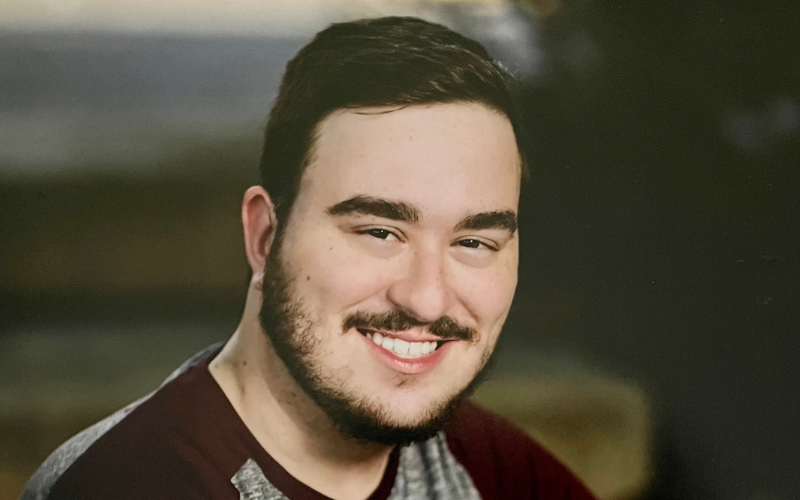
By: Trish Adkins
If you ask Cole Fitzgerald what it is like to face childhood cancer for a second time — fifteen years after his first rare cancer diagnosis — Cole will say in his Jersey accent:
“It is what it is.”
And what it is this second time around is pancreatoblastoma, a type of cancer that has only ever been documented 50 times and just once following a neuroblastoma diagnosis. That one case —that’s Cole Fitzgerald.
“It definitely came out of left field. I definitely didn't see it coming. Nobody saw it coming,” said Cole. “And it brought a lot of frustration, a lot of anger and a lot of confusion because I've been clean for the past 15 plus years.”
Before Cole’s diagnosis, he was slated to move into the dorms at Temple University; now all of that was on hold.
The odds of this double diagnosis are infinitesimal — but Cole has never had the odds on his side.
Beating the odds, the first time
Cole’s story with childhood cancer began when he was 2 years old. It was Christmas 2006. Cole developed a low-grade fever. The fever would come and go. Pediatricians thought it was pneumonia or a virus. Then, one pediatrician noticed anemia in his bloodwork.
Cole was admitted to the hospital and an abdominal ultrasound revealed the source of his fever and anemia: an 8-centimeter tumor above his left kidney. That tumor was Stage IV neuroblastoma.
The neuroblastoma had already spread from the primary tumor site to his bone marrow. His prognosis was grim. Treatment began immediately and lasted over two years. By April 2008, Cole had received six rounds of high-dose chemotherapy, several surgeries including tumor removal, a stem cell transplant, 12 localized radiation treatments and six months of Accutane treatment, a retinoid which is most commonly known as a treatment for severe acne, but also has shown efficacy in the treatment of some cancers.
Treatment finished. Cole was cancer-free, but his journey into survivorship and all the long-term complications was only just beginning.
The complications of survivorship
Before cancer, Cole was no stranger to hardship. Born at 30 weeks with sick lungs and two dislocated hips, Cole spent weeks in the NICU and required a tracheotomy to breathe for the first two years of his life. Cancer treatment added to Cole’s challenges, but together with his family, aptly nicknamed “The Fightin’ Fitzgeralds,” Cole fought to overcome and thrive.
The next 12 years after treatment were marked with triumphs and constant disease surveillance. Like all childhood cancer survivors, Cole had to have regular check-ins with his oncology team — blood work and all the anxiety, stress and pain that goes along with those tests.
Those check-ins led to Cole’s diagnosis with high frequency hearing loss caused by one of the chemotherapy drugs he received during treatment. Cole would be fitted for hearing aids when he was just 4 years old. As a result of radiation treatment, Cole developed a benign tumor called osteochondroma in his L1/L2 vertebrae that required surgical removal and spinal fusion. His heart has a slight cardiomyopathy which is manageable with medication – another late-term effect of treatment.
He also navigated all the regular moments of childhood with his very public identity as a cancer survivor.
“It’s hard living in a world where other kids aren’t cancer survivors. It’s hard to relate to other people. It’s like you stand out. I have some moments when I’m stereotyped with being a childhood cancer survivor. It is a blessing and a curse in a way,” said Cole.
Through it all, Cole kept going — exceling in school and pursuing his dream of working in athletics while serving as a high school football team manager. As an Alex’s Lemonade Stand Foundation hero ambassador, Cole also kept sharing his story and sharing the need for more childhood cancer research.
“Just a pothole in the road”
Then came 2022: Cole graduated high school and committed to Temple University to major in sports management. He accepted a position on the Temple Football equipment team. A few weeks into that job, the pain began. Pain so bad he asked to go to the hospital.
“I was basically having a normal day. I thought I’d go to the hospital, get checked out, maybe get some medication, something like that,” said Cole.
Instead, tests revealed the cancer on his pancreas, as well as some spread into his liver and other parts of his body. Cole began treatment — chemotherapy — and switched from beginning his freshman year on campus to taking classes virtually.
Pancreatoblastoma is so rare there is no standard of care and virtually no research specific to his disease.
But, still, Cole and his family have hope and fight.
“You know it’s almost like when you are driving your car on a paved road and there is a pothole. I’ve had a lot of potholes in my life, you know, and sometimes I have to go around them. Sometimes I have to drive straight toward them. And this is one I am going straight towards at full force. No matter the pain of chemo, the frustration of not being in school, not living a normal life, it is all going to be worth it when I get that scan that finally says I am free,” said Cole.

